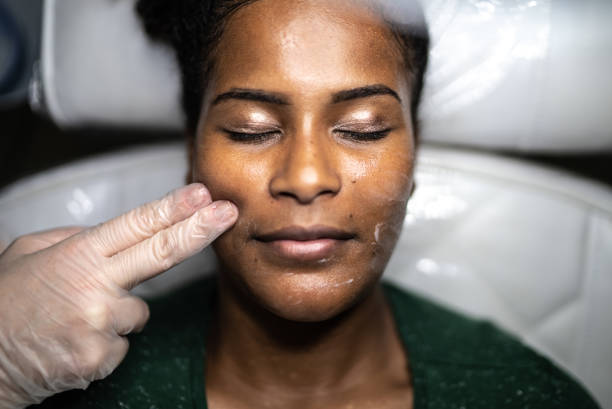
Flawless skin is what many people strive for. To have a face free of imperfections seems like a dream that can actually be accomplished, especially when there are so many procedures and treatments out there to help you achieve the look you’re going for. Whether it be a facial, dermaplaning, or even a chemical peel, there’s something out there for everyone, but how do you know what’s for you? Is a chemical peel the way to go to achieve flawless skin or are you setting yourself up for disaster?
What Is A Chemical Peel?
One of the most popular treatments today are chemical peels. Chemical peels are a type of procedure where a chemical solution is applied to the skin to remove the top layers. This allows for the skin to grow back smoother.
The reason why this type of facial procedure is so popular is because it treats discolored skin, scars and wrinkles on the face. There are also different types of peels you can get depending on the concerns you have and what your desired look is.
Who Are Good Candidates For Chemical Peels?
Typically all skin types are good for superficial chemical peels seeing as this procedure can be done on everyone who qualifies for it.
If you are someone with wrinkles, uneven skin tone, dryness and acne, then a light chemical peel may be ideal for you.
If you are someone who suffers from acne scars, deep wrinkles and or precancerous growths, then a medium or deep chemical peel may be ideal for you.
However, even if you suffer from one or more of these complications, and you think you’re a good candidate for a chemical peel, there are some factors that may hinder you from actually being a good candidate.
RELATED: 5 Super Ingredients For Glowing Skin
Who Isn’t A Good Candidates For Chemical Peels?
Yes, you may suffer from deep wrinkles, acne scarring or uneven skin tone and acne and feel as though you’re a great candidate for this type of procedure, but there are some factors that can cause you not to be a good fit for this peel.
One factor is if you have a darker skin tone. People with darker or deeper skin tones are at risk of experiencing darkening of their skin.
Another cause that may not make you a good candidate for this procedure is if you are someone who lives with an autoimmune disease such as lupus.
Most of the time, those living with something such as lupus have skin problems on the face and have to take medications for this disease. A chemical peel can cause not only extreme damage to your already sensitive face, but it can also cause more scarring and irritation.
You also aren’t an ideal patient for a chemical peel if you are someone who has a personal or family history of keloids, has taken oral acne medication, is not able to stay out of the sun during the healing period, or if you have a history of abnormal scarring or extra coloring in your scars. These are all issues that will disqualify you from getting a chemical peel.
RELATED: 5 Simple Nighttime Tips For Perfect Skin In The Morning
Interested In A Session? Here’s What You Should Know
If you are interested in a chemical peel, even if you are living with conditions that may cause you not to be a good candidate for the procedure, the best thing to do is to get a professional opinion.
Make sure you go to a dermatologist and not just a regular esthetician. This way you can get an accurate evaluation and answer about if this procedure is right for you.
You should also know that the healing process after getting a chemical peel takes time. Your skin is literally peeling off so you will be walking around looking like it. This can bring up some insecurities so be mindful that you’ll be dealing with this for at least a week minimum.
Another important detail to keep in mind is that you may have to go back and get another peel to get the desired look you’re going for. Sometimes it takes more than one peel to fully clear up any imperfections. Sometimes the procedure doesn’t work at all, so keep that in mind as well.
Regardless of whether or not you decide this is what you want to do, remember that your skin is beautiful even with imperfections. Sometimes you don’t need to fix what isn’t broken, it just needs a little more tender love and care.









